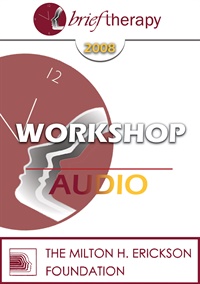BT08 Workshop 01 - Three Essentials to the Treatment of Childhood Trauma: Abreaction, Correction, and Context - Lenore Terr, MD
- Average Rating:
- Not yet rated
- Topic Areas:
- Workshops | Trauma | Brief Therapy | Children and Adolescent Therapy
- Categories:
- Brief Therapy Conference | Brief Therapy Conference 2008
- Faculty:
- Lenore Terr, MD
- Duration:
- 2:45:21
- Format:
- Audio Only
- Original Program Date:
- Dec 11, 2008
- License:
- Never Expires.
Description
Description:
Whether brief or long-term, the treatment of childhood trauma should include an opportunity for the youngster to abreact (express strong emotion), correct (find individual, community or even fantasized solutions), and to discover contexts (perspectives and understandings of the events that occurred). Dr. Terr will thoroughly discuss and exemplify these three modes of treatment, selecting brief therapies as the clinical examples.
Educational Objectives:
- To describe how abreaction, context and correction work in treating childhood trauma.
- Within the framework of brief therapy, provide one example of each of these principles.
*Sessions may be edited for content and to preserve confidentiality*
Credits
Faculty

Lenore Terr, MD Related Seminars and Products
LENORE TERR, MD, is Clinical Professor of Psychiatry at UCSF and a private practitioner in San Francisco, California. She is a pioneer in the field of childhood trauma. Her studies of the Chowchilla bus kidnapping victims, the students who witnessed the Challenger space shuttle explosion, and the survivors of the Columbine High School attack have educated pro- fessionals and lay persona around the world. Dr. Terr is the winner of the Child Psychiatry Research Award and the Biopsychological Prize of the American Psychiatric Association. She also was given the Child Advocacy Award of the American Psychological Association. Her newest book is Magical Moments of Change. A previous book, Too Scared to Cry, has been called a "classic" by the Journal of the American Medical Association.


